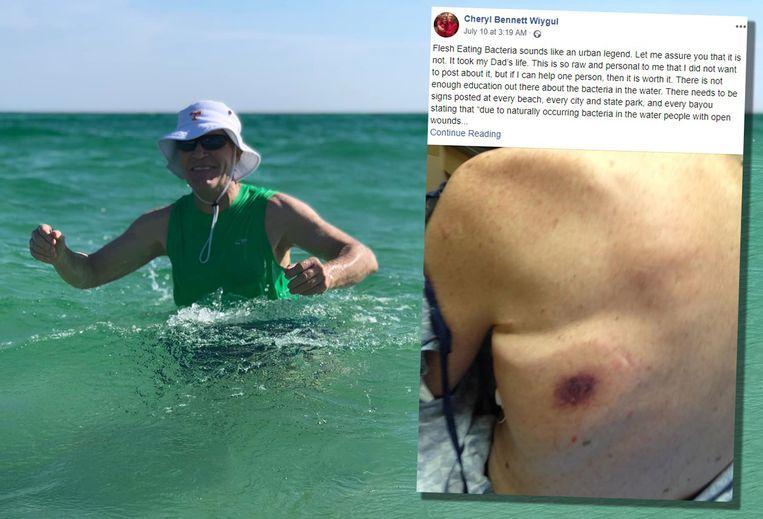An American woman explained on Facebook how her father died two days after an innocent trip to the beach due to an infection with the Flesh-eating bacteria. Cheryl Bennett Wiygul from Florida wants to warn others to be careful and not to happen to them. The gripping post has been shared tens of thousands of times in four days.
“There is not enough education out there about the bacteria in the water,” she says. “There need to be signs posted at every beach, every city and state park” that say: “due to naturally occurring bacteria in the water people with open wounds or compromised immune systems should not enter.”
Holidays
She learned it herself in the worst possible way when her parents were on vacation with her. Her father had been fighting cancer for years and finally felt good enough to make the trip.
A week earlier a story had appeared in the media about a 12-year-old girl who had been confronted with ‘necrotizing fasciitis’ or the Flesh-eating bacteria. The girl had a leg cut with that in mind, Cheryl was very alert to her weakened father.
One day, when they went to the beach, she carefully checked that he had no open wounds – which was not the case – and treated some small scratches on his arms and legs with disinfectant and water-resistant plasters.
“I thought it was safe with that,” she tells the story. “We were out in the bay on the boat near Crab Island, went to the beach in Destin twice, splashed around Turkey Creek, swam in Boggy Bayou, in our pool and then on Friday we spent the day at Rocky Bayou riding jet skis and throwing the ball around in the water. We left around 4:00 p.m.”
Her father stayed up a bit later that Friday evening and watched a movie. “He was happy and talked a lot,” she continues. “He seemed to feel good and that had been the case all week. He woke up at 4 in the morning. It was 12 o’clock after we had been in the water and he had a fever, shivered and cramped. My parents were planning to return to Memphis that morning anyway and that certainly seemed like a good idea. He would be close to his trusted doctors and he could be checked by them. They knew his medical history.”
On the way home, however, her father’s condition deteriorated further. His legs started hurting a lot and he said he wasn’t feeling well. “My father has been through a lot and is not a complainant,” Cheryl continues. “He really had to be in a lot of pain.”
Place
Around 8 p.m. her parents were in the hospital in Memphis, where he was admitted immediately. While they were helping him in his hospital garment, the nursing staff saw a black, swollen spot on his back. A place that, according to his wife and Cheryl, had not been there before.
“I told her (her mother e.d.) to tell them he was in the water in Florida and it was ‘necrotizing fasciitis’,” the woman said. “But someone replied that the media had completely blown up the danger. No biopsy was made. He did get antibiotics.”
But soon the black spot grew twice as large and a new one began to form. His arms were spotty and he complained of pain. “At 1:00 am he became septic and they brought him to the intensive care unit,” writes Cheryl. “My dad had a lot of medical issues but the heart was not one of them. They had to intubate him. He coded again. They said his organs were too damaged and his blood was too acidic to sustain life. He was gone by Sunday afternoon.”
“Less than 48 hours after getting out of the water feeling great, the bacteria had destroyed him. We got lab results today: Vibrio vulnificus which manifests into necrotizing fasciitis (flesh-eating bacteria) ultimately leading to sepsis.”
“I knew you shouldn’t swim with an open wound, but I didn’t realize that he shouldn’t swim with his weakened immune system,” said Cheryl. “Maybe I should have known, I’ll have to live with that for the rest of my life. But I am sure that if there had been a warning sign, we would not have let it go into the water.”
“I don’t want to scare anyone, but I don’t want this to happen to others either,” she concludes. “So be careful. Nobody has to tell me what we should or should not have done, we already know that. It’s too late for us. But share this message so that it might help someone else.”
